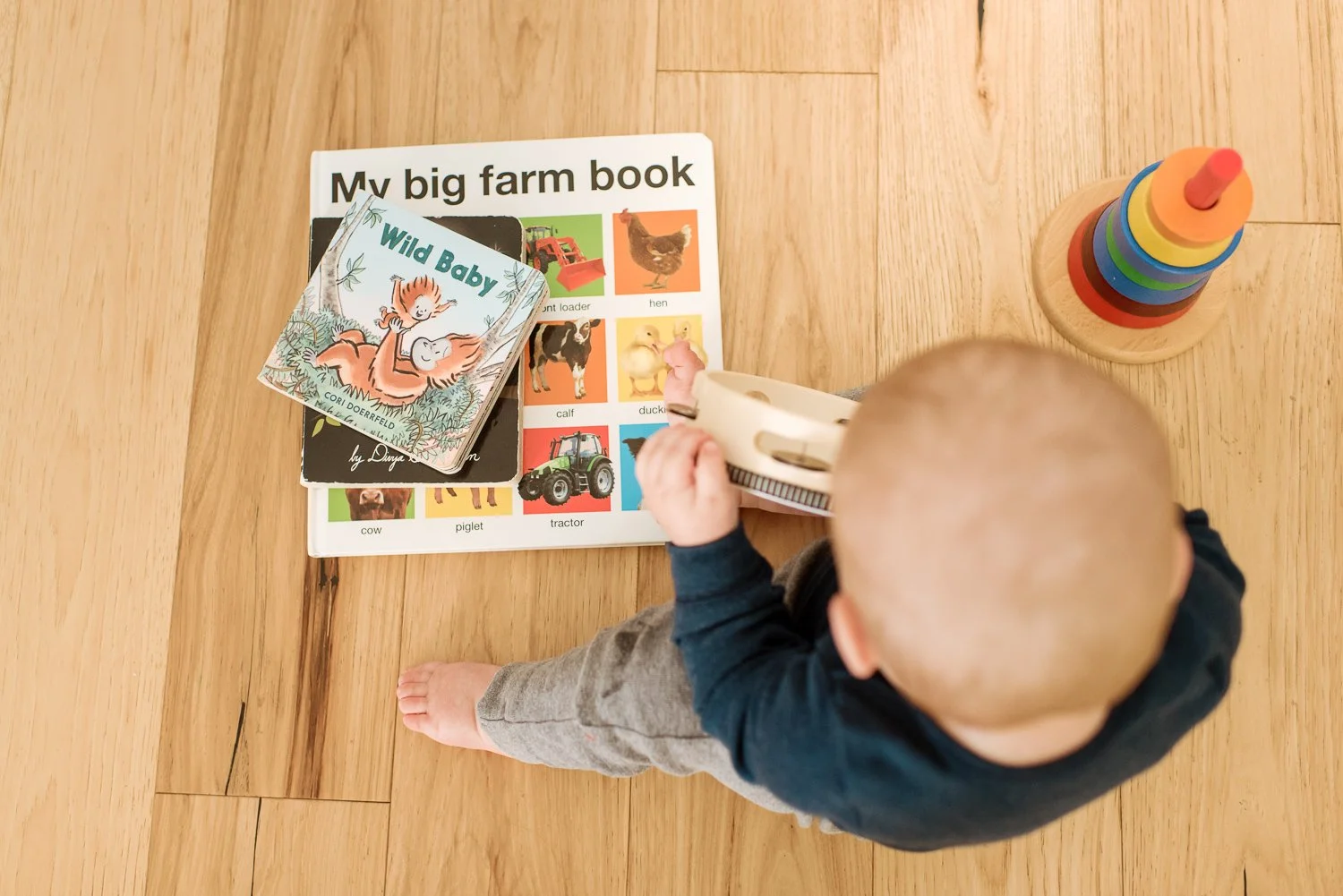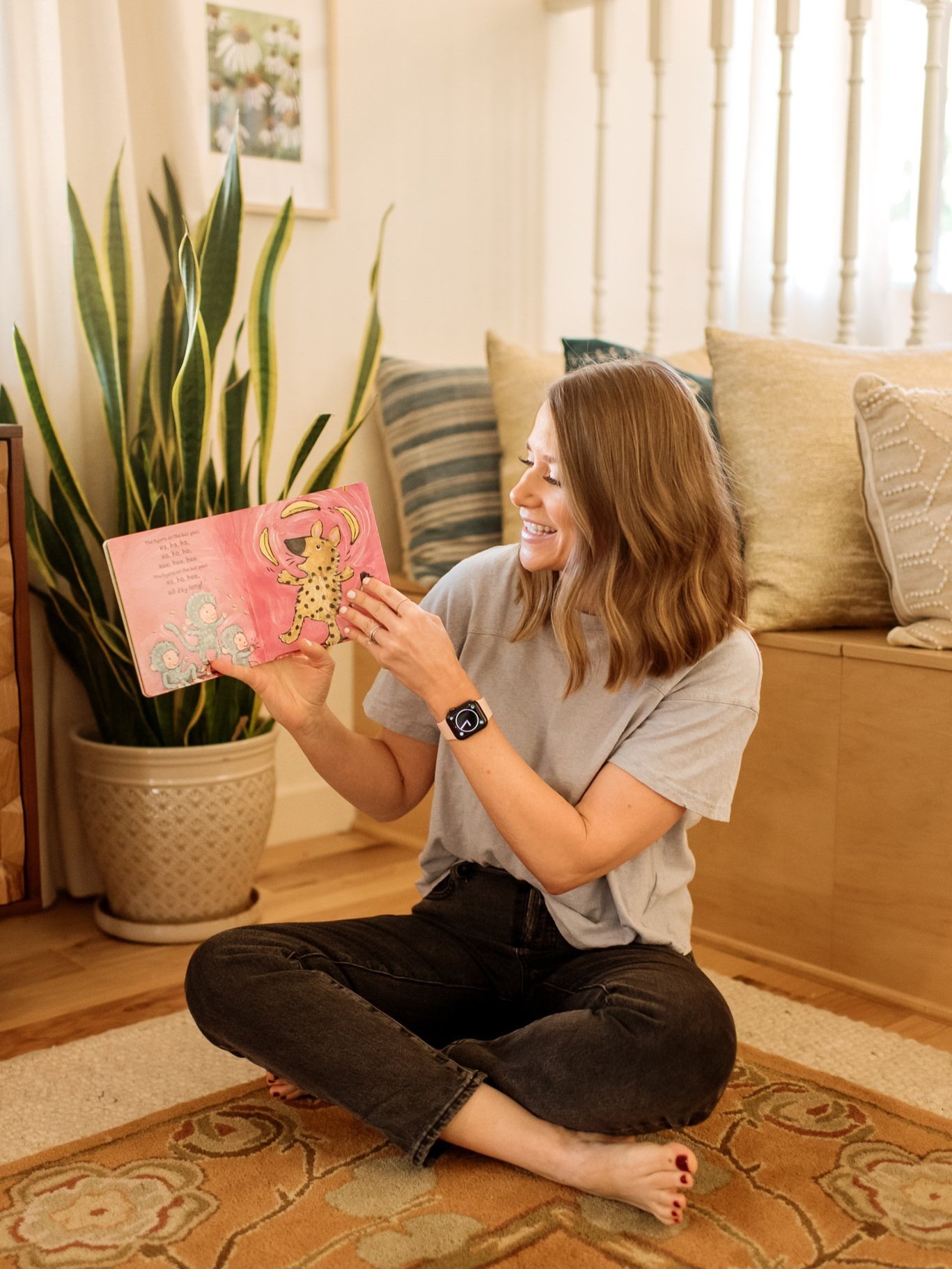A New Parent’s Guide to Teaching Baby Their First Words
If you’re wondering when your baby will finally say their first words, or what you can do to help them along, you’re in the right place! Babies are learning and gaining new communication skills every day—even before they’re talking—so what you do at home really matters. (So high five ✋🏾 to you for being here!)
In this post, we share actionable steps for how to teach your baby their first words! Plus, we give you key insights into how your baby’s speech and language develops from birth to 12 months. If you have a baby at home, we know this post is one you’ll want to read and come back to!
Speech & Language Develops Right From The Start
When we say we’re speech therapists who work with children as young as a few months old, people are often surprised! Why would a baby that’s so young need speech therapy? Well, because speech and language skills develop right from the start! Our main work at this stage is educating families on this incredible time period of rapid language growth.
As early intervention speech therapists who work with a lot of toddlers needing therapy, it's a big goal of ours to reach as many parents of babies as we can—to teach them how to support speech and language development right from the start.
Some babies do benefit from speech therapy starting in infancy—especially if they’re born with a disability or if there are feeding concerns. (Occupational therapists and other specialists may help with this, too.)
Speech and language are developmental skills, which means they build up over time. It starts off small, with the subtle, but foundational, communication skills that develop in infancy and toddlerhood. Even as babies, our littles are spending so much time figuring out the world around them, interpreting what words mean, and learning to interact socially with caregivers and familiar people! Eventually, these smaller skills build upon one another, and we start to understand our children as they say their first words, express themselves, and ask questions. Then, one day, we have children talking to us in full-on (sometimes non-stop 😂 ) sentences!
Your baby’s speech and language development is a really fun journey to be a part of, especially when you understand and can notice the small steps they take along the way. If you want to follow along with them as they grow, download our baby talking milestones checklist! You’ll be so glad you did when you’re celebrating the little things together!
Pre-Talking Skills: What Happens Before First Words
Communication involves SO much more than just words. So before we get into how to teach your baby their first words, we first need to know if they’re able to (among other skills):
Understand Words
Practice Joint Attention
Say and Imitate Sounds
So let’s dive deeper into three of the critical skills needed before your baby will start to talk.
Understanding
Does your baby understand what familiar words mean? For example, if you say “Get the BALL,” do they look toward the ball? Or, if you say, “Dada’s home!” do they look toward the door where he usually walks in? If so, great! They’re one step closer to saying their first words.
Joint Attention
Does your baby notice things when you point them out? If you show them something, can they follow your lead and notice it with you? This skill is called “joint attention”, and it’s a critical skill that your baby needs to have down pat before saying their first words.
Imitating Speech Sounds
You’ll also want to see if your baby is imitating early-developing speech sounds, like w, b, d, and m. Are they babbling and making a variety of consonant sounds? Are they using their voice with intent? (Like in response to you, or to get your attention?) If so, that’s a good sign that they’re headed in the right direction!
What Counts As A First Word?
Another thing we want to address before we cover how to teach your baby their first words is what COUNTS as a word! Because a lot of families we talk to realize that in hindsight, the criteria they were using wasn’t quite accurate.
Here’s what counts as a first word:
Animal Sounds & Environmental Noises
Yep, you heard us! “Moo” for a cow or “Vroom vroom” for a car totally count as first words. As long as the sound is used as a substitute for a label (for example, if they see a cat in a book, point to the cat, and say meow) and use the sound consistently, independently, and in an appropriate context, it counts.
Exclamatory Words
Exclamatory words are things like “wee,” and “uh oh.” They’re sounds we often use to comment on the world around us. And, when they’re used intentionally and consistently, they count as baby’s first words! For example, your baby drops their food off the highchair tray and says, “Uh oh” that counts because they’re communicating that the food fell to the ground. It also counts if they say, “Wee!” as they go down the slide, because they’re communicating that the slide is a fun experience!
Part Of A Word
A word counts as a first word even if your baby only says part of the word. (Did you get that? 😅 ) Parts of words count because what we’re looking for with your baby’s first words are their attempts to communicate intentionally, which they can often do before they’re able to produce all the different speech sounds flawlessly. So “Mo” for more counts, “nana” for banana counts, and any other partial word that follows this pattern counts, too.
Remember, speech is complex! It’s tricky learning how to move your tongue, teeth, lips, and jaw to produce speech. So when little ones are learning to talk, it’s totally natural that they make errors. The more they practice, the clearer their words will become.
Sign Language
Signs definitely count as words! So long as your little one is using the signs independently, in an appropriate context, and as long as they have signed it a few times, you can go ahead and add it to the list of words they’re “saying”. And just like with words, remember that the sign doesn’t have to be exactly perfect at this stage—because just like speech, fine motor skills are still developing at this age, so you’re bound to see a lack of precision. And that’s totally typical!
How To Teach Your Baby Their First Words
Want to teach your baby their first words? Here are 3 things to keep in mind:
#1 Encourage Developmentally-Appropriate Words
Be mindful of what developmentally-appropriate vocabulary looks like for your baby. Stick to words that have meaning to your little one, like words that are part of their world. Colors, numbers, and shapes can wait—instead, focus on teaching words that will help them communicate their wants and needs. You also want to recognize that simple words are going to be easier to say than more complex words. Your baby will learn ‘dog’ before they learn ‘crocodile’, and they’ll likely pick up ‘apple’ before ‘pomegranate’.
We love words like:
More
Help
Mine
Hi/bye
Names/Titles of Important People (Mama and Dada)
Preferred Foods
Toy Names
#2 Use The Word A LOT
Use the word you want them to learn across multiple contexts, instead of just one situation. For example, with the word “open,” you might first introduce it during book reading. (“Open the book!”) But you’ll want to make sure you’re modeling “open” during snack time too, and while you play, as you open containers. In the same way, if you’re working on the word “water,” you might label “water,” in your child’s cup, but also in the bath, or outside while you’re watering the garden or splashing in a puddle. Hearing the word across multiple contexts and in different routines will help your child understand it better. And, all that repetition will increase the likelihood that your little one will try to copy you!
#3 Introduce Baby Sign Language
Sign language can be a really helpful tool for showing little ones that their communication has power. If they’re still not saying words, but you can tell they want to communicate with you, teaching them signs gives them a bridge—a tool to use until they can make the speech sounds they need.
If you’re worried that sign language might cause a speech and language delay, or discourage your child from communicating verbally, don’t be! This is a super common misconception but we can promise sign language only helps them communicate. It will not hinder verbal communication. We have an entire module on sign language in our baby course, where we break things down into simple and manageable steps so that it’s not overwhelming!
We have SO much more to share on how to support your little one’s language development, which is why we put together our baby communication course, TalkBaby. The course is fun, practical, and connection-driven, and it teaches things like how to teach your baby first words plus how to sing, read, and connect all day, in ways that feel natural. Plus, it only takes two (ish) nap times to complete. We think you’ll love it!
The Most Common First Words for Babies
Every baby is different, but some of the most common first words are:
Mommy
Daddy
Shoes
Hi
No
More
Bath
Dog
Milk
Hot
Pro Tip: Wondering what your baby’s first word will be? Pay attention to their babbling sounds! Often, the consonants baby commonly uses while they babble become part of the first words they say. (So if they’re saying “gagaga” a lot, their first word just might be “go!”)
How To Support Your Baby’s Language Development At Home
Infancy is a critical developmental period, so what you do at home with your little one really does matter at this stage. Even if your baby isn’t saying much yet, it doesn’t mean they’re not learning and growing every single day as they prepare to talk your ear off in the best way! You have a huge impact on their communication development, so even just the fact that you’re reading this post right now is really great.
As a parent or caregiver, the best thing you can do as you anxiously await baby’s first words is to become familiar with what counts as a word, and what you can be doing at home to support them at home in fun, low-pressure ways. If you want more guidance from us on this topic, our free resources and baby course would be a great next step!
Get Our Free Baby Development Resources
If your baby is between 0-11 months, download the Baby Bundle. It’s everything you need to know, do, and watch for in their first year. And, it includes baby talking milestones, our first words freebie, and a free baby song video that you can sing to them. (No musical talent required!)
If your child is 12 months and older, you’re ready to jump into toddler learning! We recommend starting with your Toddler Language Milestones Checklist because it’s something you’ll want to become familiar with now, then keep coming back to as they learn and grow.



